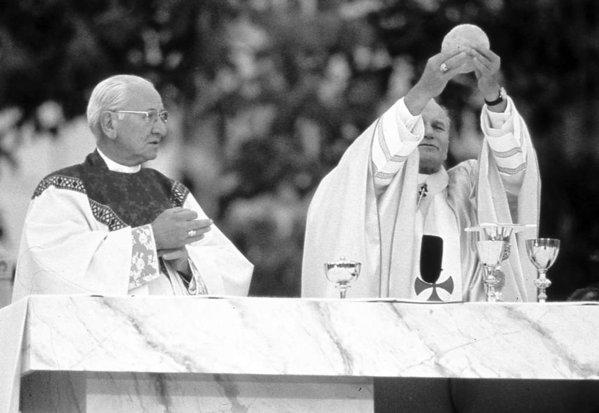|
The Pulse: The papal connection
By Michael Smerconish
Pope John Paul II had Doylestown on his mind when, just two months into his papacy, he summoned the head of the Vatican Bank to the Apostolic Palace for a private chat. The pope had decided to bail out the Pauline Fathers, the religious order that ran Our Lady of Czestochowa, the shrine in Bucks County, and that was then enmeshed in a financial scandal. That nugget is buried in a new, more-than-700-page book called God's Bankers: A History of Money and Power at the Vatican, the result of a nine-year investigation by Gerald Posner, perhaps best known for having written Case Closed, about the assassination of John F. Kennedy. Gannett News Service reported the financial improprieties from Czestochowa on the front pages of many of the chain's 80 newspapers one month before John Paul's Oct. 16, 1978, election, coverage that would both win a Pulitzer Prize and draw an unsuccessful lawsuit from the Pauline Fathers. Gannett reported: "Vatican documents show that in less than a decade, the order squandered a substantial portion of $20 million in charitable donations, loans, investments, and bond proceeds through mismanagement, dubious business practices, and what Vatican investigators described as 'chaotic' and 'immoral' lifestyles." Among the highlights: $250,000 in donations was received for Masses that were never offered; more than $400,000 solicited for memorials was spent without plaques having been erected; and automobiles and gasoline credit cards were given to the monks despite their vows of poverty. It was reportedly left to Cardinal John Krol, head of the Archdiocese of Philadelphia, to clean up the mess by raising millions to resolve outstanding debt. But Posner's new book ("revealed here for the first time") says the unrecovered losses were closer to $7.5 million and it was actually the Vatican Bank, at the direction of the new pope, that paid more than 80 percent of the claims by writing a $5 million check. John Paul, Krol, and the Rev. Michael Zembrzuski, founder of the Doylestown shrine, had Polish heritage in common. Posner writes that Zembrzuski had traveled to Poland seeking guidance for his problems from that nation's top prelate, Cardinal Stefan Wyszynski, and Cardinal Karol Wojtyla (who would soon be the new pontiff). In December 1979, the new pope, John Paul, summoned Bishop Paul Casimir Marcinkus, the Vatican Bank chief, Posner says. Marcinkus was himself then under fire for reports that he had recklessly invested the church's money with some tainted Italian businessmen. Marcinkus could easily have believed he was about to be dismissed. Instead, the meeting would help John Paul, the first non-Italian elected pope in more than 450 years, establish a working relationship with the Chicago-born Marcinkus, the first American to ever hold the top spot at the powerful Vatican Bank. John Paul asked Marcinkus to fix Czestochowa, Posner says. And taking care of the Pauline controversy was only a prequel to the much more ambitious project the duo would undertake: supplying money and supplies to the Polish resistance to try to bring down that country's communist government. "The backdoor deal over the Paulines was the initial glue of the John Paul-Marcinkus friendship," Posner writes. In a footnote, he reports that "Cardinal Krol personally oversaw the distribution of the funds through his own diocese so the source of the money appeared to be from Philadelphia as opposed to Rome." A spokesman for the archdiocese said it was important to note that Posner had not reached out for any comment while writing the book, and that there was currently no one in archdiocesan administration who served in Krol's senior administration 40 years ago. Krol died in 1996, and archdiocesan finances are separate from the Vatican and the Czestochowa shrine. As for why the Paulines got off the hook, "they simply got lucky," Posner told me recently. "The vicar general at the center of the most salacious abuses counted the new pope as a friend," Posner said. "That meant he was able to bypass the traditional Vatican gatekeepers and appeal directly to the new pontiff to intervene fast to save the order. That's exactly what the pope did. He wanted the entire scandal and all the bad ink brought to a fast stop. And he thought the monks had suffered enough public humiliation. For the scandal-plagued Paulines, it was good to have friends in high places." How does Posner know? He credits Francesco Pazienza as his source, whose version Posner says he was able to independently confirm. "Hollywood would have trouble coming up with as colorful a character as Francesco Pazienza," Posner said. "A former Italian intelligence officer, nonpracticing physician, and adventurer, he was convicted in Italy of trying to derail an investigation into a 1980 train station bombing. "In the past, he has popped up with insider information about everything from national banking scandals to who might have been behind the Turkish gunman who tried to kill John Paul in 1981. It was Pazienza who dug up the dirt that became a 1980 campaign issue about Jimmy Carter's brother, Billy, meeting secretly with Libya's Moammar Gadhafi. "Since getting out of prison in 2009, he has generally steered clear of journalists. My introduction to him came through an Italian priest who was a longtime friend of his."
|
.
Any original material on these pages is copyright © BishopAccountability.org 2004. Reproduce freely with attribution.
